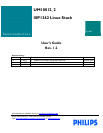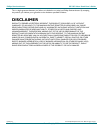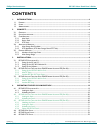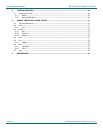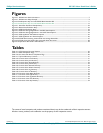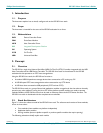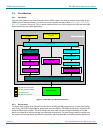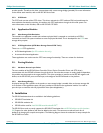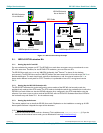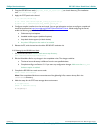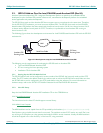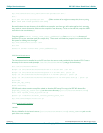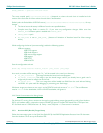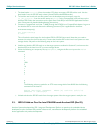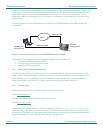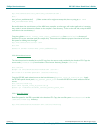
Philips Semiconductors ISP1362 Linux Stack User’s Guide
UM10012-_2 © Koninklijke Philips Electronics N.V. 2003. All rights reserved.
User’s Guide Rev. 1.2—July 2003 6 of 34
1. Introduction
1.1. Purpose
This document explains how to install, configure and use the ISP1362 Linux stack.
1.2. Scope
This document is intended for the users of the ISP1362 evaluation kit on Linux.
1.3. Abbreviations
DCD Device Controller Driver
FSM Finite State Machine
HCD Host Controller Driver
IDP Integrated Development Platform
OS Operating System
OTG On-The-Go
USB Universal Serial Bus
2. Concept
2.1. Overview
The ISP1362 is a single-chip Universal Serial Bus (USB) On-The-Go (OTG) Controller integrated with the USB
Host Controller and the USB Device Controller. The ISP1362 Linux stack is the software for the ISP1362
evaluation kit that operates as an OTG mass storage device.
Using the ISP1362 Linux stack, the ISP1362 can function as:
• A standard USB full-speed mass storage device when connected to a PC running any OS
• A USB full-speed OTG mass storage device when connected to any OTG device
• A USB host when connected to USB peripherals (OTG and non OTG).
The ISP1362 Linux stack is a group of kernel and application modules arranged such that the code can be easily
ported to any other platform running the Linux OS. All the platform-specific modules are made as separate
modules. Besides, the ISP1362 Linux stack can be used as reference code to build OTG device firmware. The
ISP1362 Linux stack is distributed with the complete source code files.
2.2. Stack Architecture
Figure 2-1 shows the software model of the ISP1362 Linux stack. The software stack consists of three modules,
shown in three colors:
• Core modules (these modules are platform-independent)
• Application demo modules
• Porting modules (these are platform-specific or product-specific modules that require porting).
The following subsections briefly explain each module.



